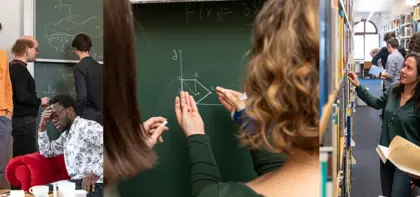
Algebra and Geometry (AG)
Description of Research
Algebraic Geometry.
This is the study of solution sets to polynomial equations in several variables. If the variables range over the real numbers, then one speaks of real algebraic geometry, which is a subject with many applications, e.g., in optimization and statistics.
Lie Groups and Number Theory.
Number theory is a central field in mathematics, with ramifications in logic, algebra, and algebraic geometry. In this context, we study automorphic forms and their relations to representations of Lie groups over fields of an arithmetic nature. This stands in contrast to the appearance of Lie groups in the study of homogeneous spaces, particularly in higher Teichmüller theory, which is also studied in this working group.
Differential and Symplectic Geometry.
The strong geometry division at the IMPRS covers Riemannian geometry, complex geometry, and symplectic geometry. Riemannian geometry enters the classification problems for black holes, rigidity results, or the geometric analysis of initial data sets. Symplectic geometry underpins all of classical mechanics. In some cases, symplectic automorphisms describe the evolution of physical systems. Such systems exhibit both a generic tendency for chaotic behavior as well as rigidity in the Hamiltonian case. At the intersection of complex geometry and complex dynamics, one studies holomorphic foliations and rigidity results for manifolds admitting a Levi foliation.
Combinatorics.
It has been said that combinatorics is the nanotechnology of mathematics. The term is sometimes used synonymously with "discrete mathematics". This field is closely connected with computer science. Local expertise includes geometric combinatorics and polyhedral algorithms, graphs, hypergraphs and their applications, and tropical combinatorics and their connection to computer algebra.
Data and Computation.
Recent years have seen explosive development in data science. Mathematics plays an important double role: it provides method for analyzing data, but it also generates interesting data in its own right. Mathematical software packages play a significant role here. Data analysis that uses various innovative approaches from geometry and topology to make sense of high-dimensional data is studied in our IMPRS.
Scientific Members working in this area
Judith Brinkschulte
James Reed Farre
Tobias Finis
Lukasz Grabowski
Jürgen Jost
Michael Joswig
Dani Kaufman
Dan Kráľ
Anna Parlak
İrem Portakal
Hans-Bert Rademacher
Érika Roldán
Anna-Laura Sattelberger
Matthias Schwarz
Rainer Sinn
Peter Smillie
Peter F. Stadler
Bernd Sturmfels
Simon Telen
Anna Wienhard
Current PhD Students
Lukas Barth
Veronica Calvo Cortes
Valerie Freund
Paula Heim
Joris Koefler
Felix Lotter
Elke Neuhaus
Niharika Chakrabarty Paul
Jiajun Shi
Alumni
The graduates are organized alphabetically by last name. To make navigation easier for you, you can either select the initial letter directly or use the year selection to display all entries from a specific year. Additionally, you will find the title, advisor, and graduation year here. If you would like more information about a particular work, simply click on the title of the thesis.

